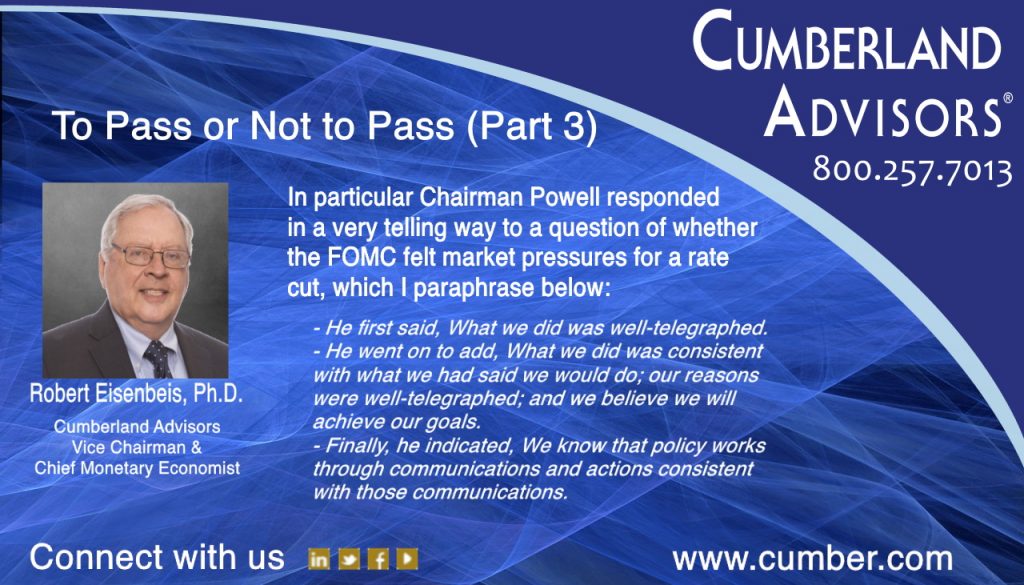The FOMC decided to throw a pass by cutting rates; but given the market’s response, it looks like they were tackled for a loss. In Woody Hayes’ parlance, the one positive of a forward pass turned into a negative.
Powell attempted to offer three justifications for the policy move: to insure against downside risks, to counter global weakness and trade uncertainty, and to help push towards the Committee’s 2% inflation goal. These explanations appeared to be greeted with some skepticism by the media. But, more importantly, there were really two significant moments in the press conference, one of which has gotten little attention so far.
In response to a question, Powell first suggested that the way to think about the cut was as a mid-cycle adjustment. Markets initially interpreted this during the press conference as “one and done,” which was not what markets had hoped for, and the Dow dropped 478 points. But it recovered somewhat to close down 325 after Powell appeared to walk back the inference to suggest that future cuts would be dependent upon incoming data.
But the interesting takeaway from the press conference concerns the policy formulation process and related communications and may represent a significant change with important implications. It raises all sorts of questions about non-meeting meetings, speech coordination, etc. In particular Chairman Powell responded in a very telling way to a question of whether the FOMC felt market pressures for a rate cut, which I paraphrase below:
He first said, What we did was well-telegraphed.
He went on to add, What we did was consistent with what we had said we would do; our reasons were well-telegraphed; and we believe we will achieve our goals.
Finally, he indicated, We know that policy works through communications and actions consistent with those communications.
That interchange raises all sorts of questions about how closely markets will need to monitor and process speeches and other communications by FOMC participants. Chairman Powell strongly implied in his monetary-policy testimony before Congress that a rate cut was likely. President John Williams, for example, spoke before the blackout period leading up to the meeting and clearly implied that it would be better to take preventative measures than to wait for a disaster. These are but two examples of the “telegraphing” to which Chairman Powell referred. But were these communications coordinated? How could rate cuts be “well-telegraphed” if there had been no advance discussions and agreements? Are certain Board members and FOMC voting members discussing policy with each other before the meetings? All these questions not only deserve answers but also suggest that, going forward, Fed watching will be heightened and markets will respond to the possibility that they are getting advance information on policy moves. This is not the way the policy should be conducted.
Robert Eisenbeis, Ph.D.
Vice Chairman & Chief Monetary Economist
Email | Bio
Read Part 1 here: To Pass or Not to Pass? (Part 1)
Read Part 2 here: To Pass or Not to Pass? (Part 2)
Read Part 3 here: To Pass or Not to Pass? (Part 3)
Links to other websites or electronic media controlled or offered by Third-Parties (non-affiliates of Cumberland Advisors) are provided only as a reference and courtesy to our users. Cumberland Advisors has no control over such websites, does not recommend or endorse any opinions, ideas, products, information, or content of such sites, and makes no warranties as to the accuracy, completeness, reliability or suitability of their content. Cumberland Advisors hereby disclaims liability for any information, materials, products or services posted or offered at any of the Third-Party websites. The Third-Party may have a privacy and/or security policy different from that of Cumberland Advisors. Therefore, please refer to the specific privacy and security policies of the Third-Party when accessing their websites.
Sign up for our FREE Cumberland Market Commentaries
Cumberland Advisors Market Commentaries offer insights and analysis on upcoming, important economic issues that potentially impact global financial markets. Our team shares their thinking on global economic developments, market news and other factors that often influence investment opportunities and strategies.


